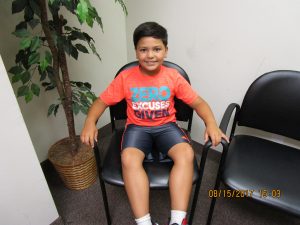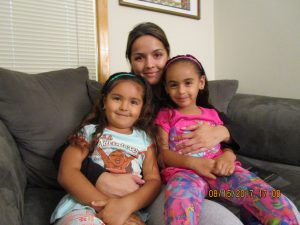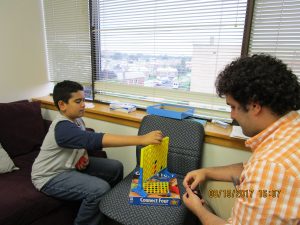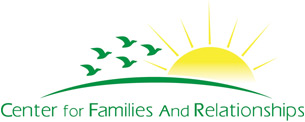Therapy Services
CFAR’s outpatient mental health program for adults and children is located in Northeast Philadelphia and provides individual, family and couples counseling depending on the needs of the individual. In addition, we provide psychiatric evaluations and medication management for those actively in therapy treatment. To learn more about each of our services click the boxes below.
 Individual therapy is a type of therapy in which an individual works with a therapist to address personal issues they are facing. It is an effective treatment for many emotional and mental health challenges ranging from dealing with depression and/or anxiety, previous trauma, major life challenges, personal growth or greater self-understanding. Since our therapists are specifically trained in family systems therapy, our approach also includes a look into family and community to see what may be impacting the presenting problem.
Individual therapy is a type of therapy in which an individual works with a therapist to address personal issues they are facing. It is an effective treatment for many emotional and mental health challenges ranging from dealing with depression and/or anxiety, previous trauma, major life challenges, personal growth or greater self-understanding. Since our therapists are specifically trained in family systems therapy, our approach also includes a look into family and community to see what may be impacting the presenting problem.
 Family therapy is a type of treatment designed to specifically help families’ mental health and functioning. Family therapy helps the individual members build stronger relationships, improve communication and manage conflict within the family system, increasing overall family functioning. This is our preferred method when working with children. We become partners in parenting, helping parents feel less overwhelmed and empowering them to make the changes needed to support their child. Family therapists are extensively trained in working relationally with members of a family to process trauma or loss, domestic violence, divorce, behavioral issues, parental conflict, struggles with emotion regulation, school problems, etc. working to improve communication and resolve conflict.
Family therapy is a type of treatment designed to specifically help families’ mental health and functioning. Family therapy helps the individual members build stronger relationships, improve communication and manage conflict within the family system, increasing overall family functioning. This is our preferred method when working with children. We become partners in parenting, helping parents feel less overwhelmed and empowering them to make the changes needed to support their child. Family therapists are extensively trained in working relationally with members of a family to process trauma or loss, domestic violence, divorce, behavioral issues, parental conflict, struggles with emotion regulation, school problems, etc. working to improve communication and resolve conflict.
Whether in an intimate relationship or a co-parenting relationship, couples therapy helps clients to recognize and resolve conflict helping to improve relationships through exploration of family of origin and relational patterns of behavior.
Couples therapy is aimed at improving the relationship between partners by gaining insight into patterns that perpetuate conflict. Understanding and making a conscious effort to change the patterns, helps couples increase healthy communication, enhance connection, increase intimacy and improve overall relationships satisfaction. A couple’s therapist will help by gaining insight into relationship dynamics, understanding the role that each partner plays in the pattern, working with the couple to talk openly to each other and challenging them to change the pattern impacting the conflict.
Parenting group provides a supportive environment for parents to share their struggles with one another. Therapists provide education around childhood development as well as healthy parenting skills helping to empower parents and help them feel supported. Topics vary each group.
Co-parenting sessions can include anyone involved in parenting children whether it be mother/family (never married, married, divorced or separated), parent/grandparent, etc. The goal of these sessions is to improve communication and conflict resolution skills to get caretakers working on the same page in the best interest of the child.
CFAR offers various educational and therapeutic groups. The groups run for ten weeks and clients receive a certificate upon completion. The following groups are offered at the center:
- Parenting: This support group helps parents learn about child development.
- Anger Management for men, women, children (7 to 12) and teens. This groups is used to educate and help participants to understand the emotion of anger, learn to use it appropriately, and recognize the positive aspects of this strong emotion.
Utilized for both children and adults, art therapy is used as a means to process and express feelings in a safe environment through the use of art expression.
An art therapist uses art expression as a guide to facilitate empowering children or adults in the often complicated process of self-understanding. It has been discovered that the modality of art as therapy enhances the expression of emotions (often highly charged) that lie underneath the surface of outward behavior. These feelings, which children especially may have difficulty expressing verbally, can (through art) be safely expressed in a protected and accepting environment.
Art activity combined with spontaneous play, storytelling or role playing, has a positive effect, stimulating the imaginations of children. This accounts for the following:
- Improved capacity to think abstractly
- Facilitation of problem-solving skills
- Improvement in impulse control
- Increased attention span
- Decrease in anxiety
- Increase in motivation
- HOPE FOR THE FUTURE

Play therapy is a form of therapy that can be effective in helping children identify and process emotions a non-threatening way. Utilizing sand trays, puppets, board games, art, a doll house or even free play, it allows children the freedom to express thoughts and feelings without having to use words. Play therapy is generally used with children between the ages of 3-12.
CFAR offers several specialized evidence-based services in our outpatient program in which therapists have received extensive training in order to provide.
Trauma-Focused Cognitive Behavioral Therapy (TF-CBT)
The goal of TF-CBT is to help children process a trauma they experienced. In this therapy a therapist works with the child individually to increase skills such as communicating and expressing feelings and utilizing coping skills. The child works to re-create the story of their trauma while being able to express feelings and emotions surrounding the difficult experience in detail through gradual exposure. Simultaneously, the therapist works with the parents to prepare them to hear the story of their child’s trauma and to be able to provide support, helping a child feel safe and increase healthy communication. This is a brief therapy model that lasts roughly 15-20 sessions.
Prolonged Exposure (PE)
The goal of Prolonged Exposure is to teach individuals to gradually approach their trauma-related memories, feelings and situations. They presumably learn that trauma-related memories and cues are not dangerous and do not need to be avoided. This is an intense trauma therapy that involves 90-minute sessions over a course of 8-15 sessions.
Eco-Systemic Structural Family Therapy (ESFT)
The goal of ESFT is to build and nurture the family process. ESFT is a hands-on approach to tackling difficult life situations. The ESFT therapist “joins” with the family to identify and understand the patterns that govern their interactions by building relationships with each member of the family system. ESFT works to identify core negative interactional patterns happening within the family, helping the family understand and work to change the pattern and apply what they learned in session in the home.
A Psychiatric Evaluation is a diagnostic tool used by a psychiatrist to:
- Collect an extensive history
- Include the client while making decisions about treatment planning
- Rule out other physical issues that may be causing symptoms
- Identify long term problems that might emerge in the future
- Make changes to treatment for those who have been evaluated in the past
- Diagnose
Medication Management is scheduled for those clients put on medication by the psychiatrist after the psychiatric evaluation to routinely check in on medication effectiveness. Medication management appointments range from 15-30 minutes.
What makes CFAR special?
CFAR is the only non-profit agency in Philadelphia in which all of our therapists are trained specifically in Marriage and Family therapy. We work off the belief that the whole of a family is greater than the sum of its parts. We do not see one person in the family as the problem but instead view the person acting out as the symptom barrier, acting out as a result of what is going on within the family system. We believe that a change in one part of the family affects the entire family. We at CFAR are dedicated to our work as family therapists and include everyone in therapy that is willing to be involved including parents, grandparents, aunts, uncles, cousins, siblings, foster parents, etc to help support the family so that they are able to have more healthy interactions and alleviate symptoms of the individual with the presenting problem. CFAR also has art therapists who work in conjunction with the family therapists for those clients who have difficulty verbally expressing feelings.


